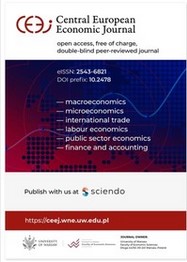Ridesharing in the Polish experience: A study using unified theory of acceptance and use of technology
Ridesharing in the Polish experience: A study using unified theory of acceptance and use of technology
Author(s): Stefan Cylwik, Renata Gabryelczyk, Marcin ChlebusSubject(s): Economy, Evaluation research, ICT Information and Communications Technologies, Transport / Logistics
Published by: Wydawnictwa Uniwersytetu Warszawskiego
Keywords: sharing economy; ridesharing; vanpooling; Technology Acceptance Model; Unified Theory of Acceptance and Use of Technology;
Summary/Abstract: The main aim of this article is to examine the factors that influence the acceptance of ridesharing technologies in Polish society, including dynamic vanpooling on demand. The study was conducted using the UTAUT 2 model (Theory of Acceptance and Use of Technology). We have employed statistical and econometric data analyses such as factor analysis and linear regression using the Partial Least Square (PLS) method. Based on the review of the publications on ridesharing in the context of sharing economy, we have modified the UTAUT 2 model by supplementing it with the trust factor, which is a significant contribution to the development of this theory when applied to the acceptance of ridesharing technologies. Further, the outcomes allowed us to identify the factors that influence people’s attitudes in using shared-ride technology (performance expectancy, hedonistic motivation and habit) and the intention to use this technology (effort expectancy, performance expectancy, price value, habit and trust). This study has practical implications as it has helped identify the factors that affect the acceptance of ridesharing technologies in Poland and these factors are significant for the suppliers of these technologies. The findings can certainly become a starting point for further research on other communities and the application of other models of technology.
Journal: Central European Economic Journal
- Issue Year: 7/2020
- Issue No: 54
- Page Range: 279-299
- Page Count: 21
- Language: English

